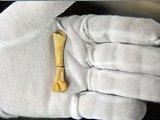Today.Az » Weird / Interesting » Archaeologists unearth 67,000-year-old human bone
04 August 2010 [16:00] - Today.Az
 Archaeologists in the Philippines have unearthed a 67,000-year-old human bone in a discovery they claim proves the area was settled by man 20,000 years earlier than previously thought.
Archaeologists in the Philippines have unearthed a 67,000-year-old human bone in a discovery they claim proves the area was settled by man 20,000 years earlier than previously thought.
The foot bone - found during a four-year excavation project of a network of caves - predates the 47,000-year-old Tabon Man that was previously known as the first human to have lived in the Philippines. The discovery was made at the Callao caves near Penablanca, 210 miles north of Manila.
"So far this could be the earliest human fossil found in the Asia-Pacific region," Professor Armand Mijares, of the University of the Philippines Diliman, who led the team of archeologists, told GMANews.TV.
"The presence of humans in Luzon shows these early humans already possessed knowledge of seacraft-making in this early period."
Prof Mijares said the evidence suggested that Callao Man or his ancestors reached Luzon in the Philippine archipelago by raft at a time when experts did not think humans were capable of travelling long distances by sea.
Cut marks on bones from deer and wild boar that were found around the human remains suggest that Callao Man was an accomplished hunter, he said, although no tools were found during the dig. Professor Mijares said he was "shocked and elated" at the discovery, explaining that such a find was something people in his field dream of.
Archaeologists from the University of the Philippines and the National Museum dug up the third metatarsal bone of the right foot in 2007, but it has taken three years to work out the age of the 2.4 inch metatarsal bone, using a method called uranium series dating, which has been carried out in France.
Professor Mijares said that Callao Man also shared some features of today's Aetas, the short, curly-haired, dark-skinned people who are indigenous to the Philippines. The team now plans to apply for permits for a larger excavation of the Callao caves in the hope of making further discoveries to cement their theories.
/Telegraph.co.uk/
|
|